Page content
Introduction
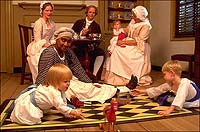
Americans today talk about rapid change threatening the moral and cultural values of the “traditional American family.” Colonial Williamsburg helps guests look back and see the family as both an agent of change and a product of historical forces.
There has never been one American family. Africans, Indians, and Europeans each had families and family customs. Those changed in the 17th and 18th centuries, not only in how family members related within the group, but also in how the family related to the larger society. Africans were uprooted from traditional homelands and family practices. They were subjected to the will of white Virginians. To a somewhat lesser, but still massively disruptive extent, so were Virginia Indian tribes.
By the end of the 18th century, first among the gentry, then spreading downward, white American families started to develop what we call the “modern” family — a mother, father, and their children, openly affectionate and relatively equal. That became the model for all families in all groups. Paradoxically, that is what we call a “traditional” family.
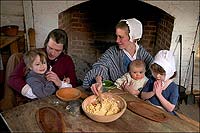
Surviving the 17th Century
Harsh conditions of everyday life, which made the formation of stable families difficult for the first generations of European and African immigrants, began to ease by the end of the 17th century. Native-American family patterns, by contrast, continued to be decimated by disease, displacement, and warfare. Learn more.
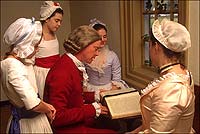
The European Family
European traditions informed the newest Americans' philosophy of family structure: a patriarchal ideal in which the father ruled over the house and extended family. Emerging democratic ideals also would redefine family roles for whites. Learn more.
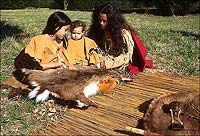
The Native-American Family
Native American societies were matrilineal, and divided the work of home, field, and hunt along gender lines. European disease, displacement, and warfare decimated their societies. Traditional dress, language, and customs were eroded by exposure to Europeans. Learn more.
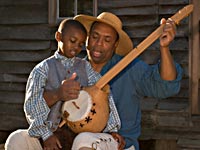
The African American Family
Africans, who organized their society around complex extended-family networks, were devastated when the slave trade ripped them from their villages and relatives. As they began their own families in America, traditional African values were passed on to a new generation of African-Virginians. Bonds were fragile, since blacks were denied legal marriage, and members were separated when owners sold and traded parents and children. Learn more.
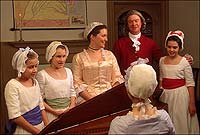
Changing Roles
A more openly affectionate, child-centered family that reflected egalitarian republican sentiments and changing roles for men and women began to emerge among gentry and middling white families after the middle of the eighteenth century. Learn more.
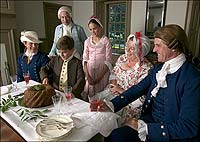
An Evolving Society
As the colony stabilized following its early struggles, a white middle class emerged. Social interaction grew in importance, and with it grew the value of manners and deportment. Families became more open and affectionate, turning away from the European patriarchal model. The Revolutionary War brought abrupt change: husbands left, and goods became scarce. For Native Americans and African Americans, an increasing European presence spelled the decline of family and and the loss of traditional culture. Learn more.

Moving Toward Today's Family
Family change did not stop in the next 200 years. There have continued to be momentous changes in American society that affected the families of all economic classes and ethnic groups. There has been westward expansion, Indian reservations, waves of immigration, changes in economic opportunity, wars, the abolition of slavery, the Victorian ideal of behavior, the growth of American industry and American cities, the civil rights struggle, the women’s movement, the nonconforming 1960s, and more. Families as we have come to know them and as we think they should be are a legacy of the 18th century. Learn more.
Content excerpted from the Colonial Williamsburg Foundation’s publication “Becoming Americans”.
